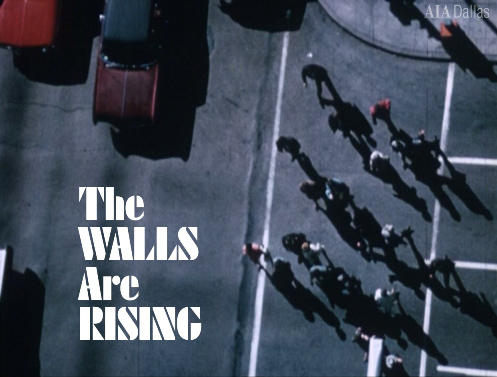“The real trouble with this world of ours is not that it is an unreasonable world, nor even that it is a reasonable one. The commonest kind of trouble is that it is nearly reasonable, but not quite. Life is not an illogicality; yet it is a trap for logicians. It looks just a little more mathematical and regular than it is.” GK Chesterton
——————–
Last night, the Dallas AIA and Paula Bosse of Flashback Dallas, treated us to one of the more bizarre films I’ve ever seen: The Walls Are Rising. A 1967 series of stills set to music, with a voice over warning about the perils of designing for cars and dividing the city.

I’m still not totally sure what to make of it. Given the omniscience of time and the dejectedness of our reality, we can look back now and chuckle a bit. Until we walk back outside the door and realize we are dealing with the exact same issues. Not that this film, nor the 1960’s in general really had the solutions. When it focused on the human element, it succeeded. When it focused on actual design, it failed as it always does applying superficial aesthetic solutions to deeper, systemic policy problems.
In any system, to fix it, you can allow it to fix itself if you address the root cause. In the case of cities, we’ve allowed Purpose, the base level of any complex system, to be redefined. Another world for purpose might be priority. We’ve redesigned our cities entirely in the facilitation of car movement rather than any other interest. It tends to work best when you remember who lives in cities, people, lest you not want it desirable or even inhabitable.
There were some hyper-dramatic moments of prolonged score that seemed to linger way too long. At times, I wondered if this was a Leni Riefenstahl movie on equal parts acid, quaaludes, and irony.
Perhaps it was the opening score, however or even the use of the theme song from the 1960’s James Bond movie Thunderball that got me thinking about James Bond. Not the cliche hero that saves the day of the old movies or even the most recent reboot, but from Casino Royale, my personal favorite. Casino Royale, unlike any of the others, approached Noir. Also, not in the cliche sense of simply black and white (but the opening scene of Casino Royale does make that very literal connection), but instead of the anti-hero trying to figure out a world of powerful forces conspiring against him.
It works for a dark Bond movie, because noir typically uses a detective, a simple literary device paralleling attempting to decipher the mysteries of a confounding world where the audience knows a little bit more, but not enough.
I don’t know if this was intentional or not in The Walls are Rising. The narrator certainly had a defeated tone, aware that those larger forces are conspiring against their grand visions for the city, but they couldn’t understand why nobody was listening.
Perhaps the audience wasn’t ready then. Maybe it’s not ready now. Not unless we drop the superficials and focus on the deeper underlying problem of Purpose, of prioritization, wherein the design is a natural outgrowth, and as the movie suggests, “someday a city might address all of its problems in one unified front through one grand vision. Maybe that city can be Dallas.”
Have we figured it out? Are we ready to invest and build a city for people?






